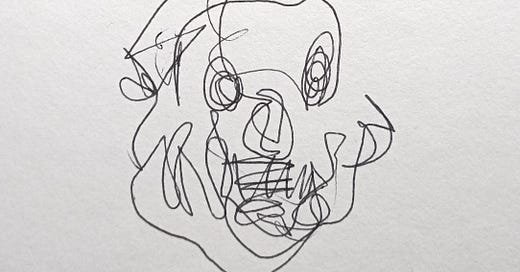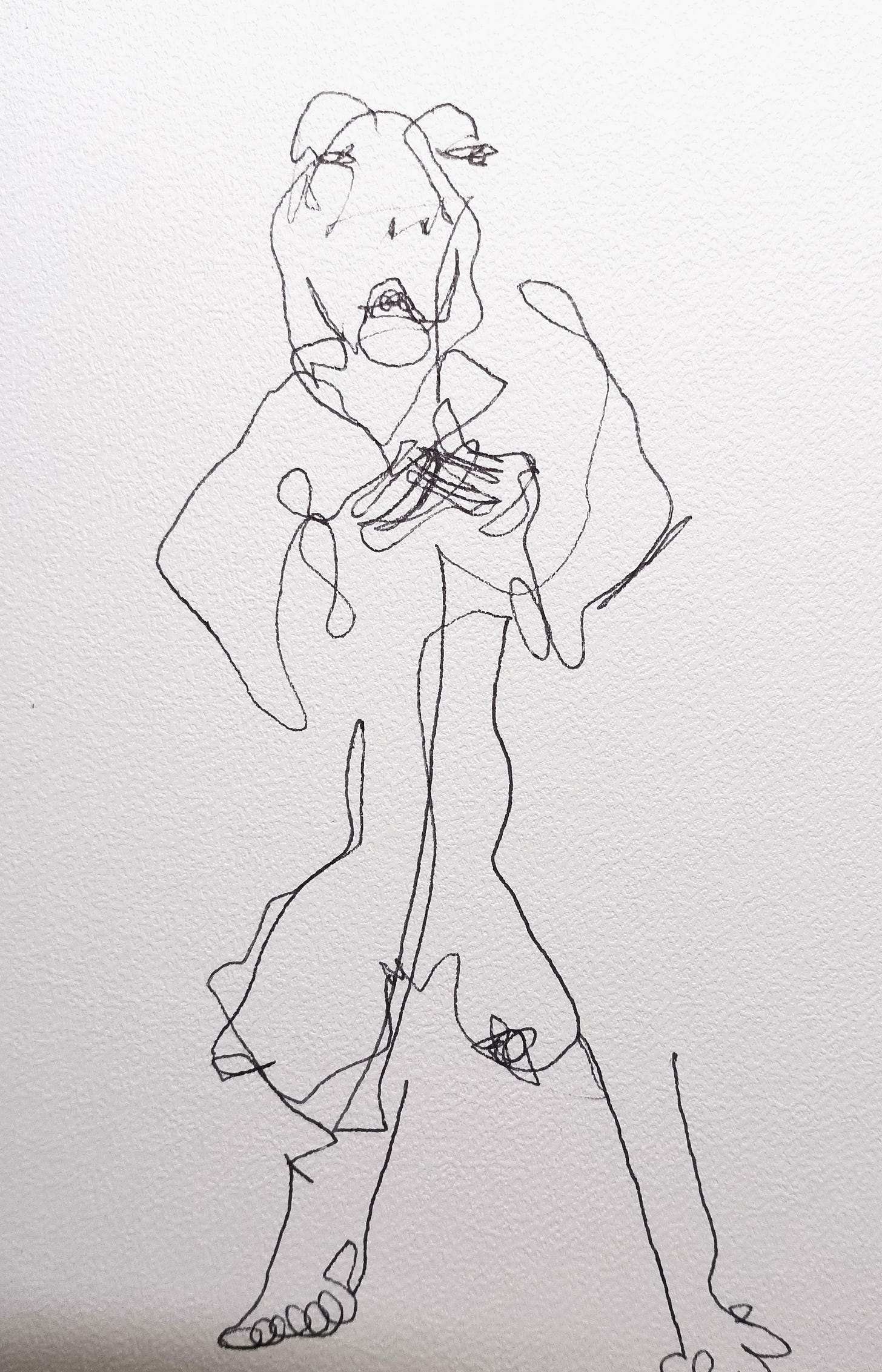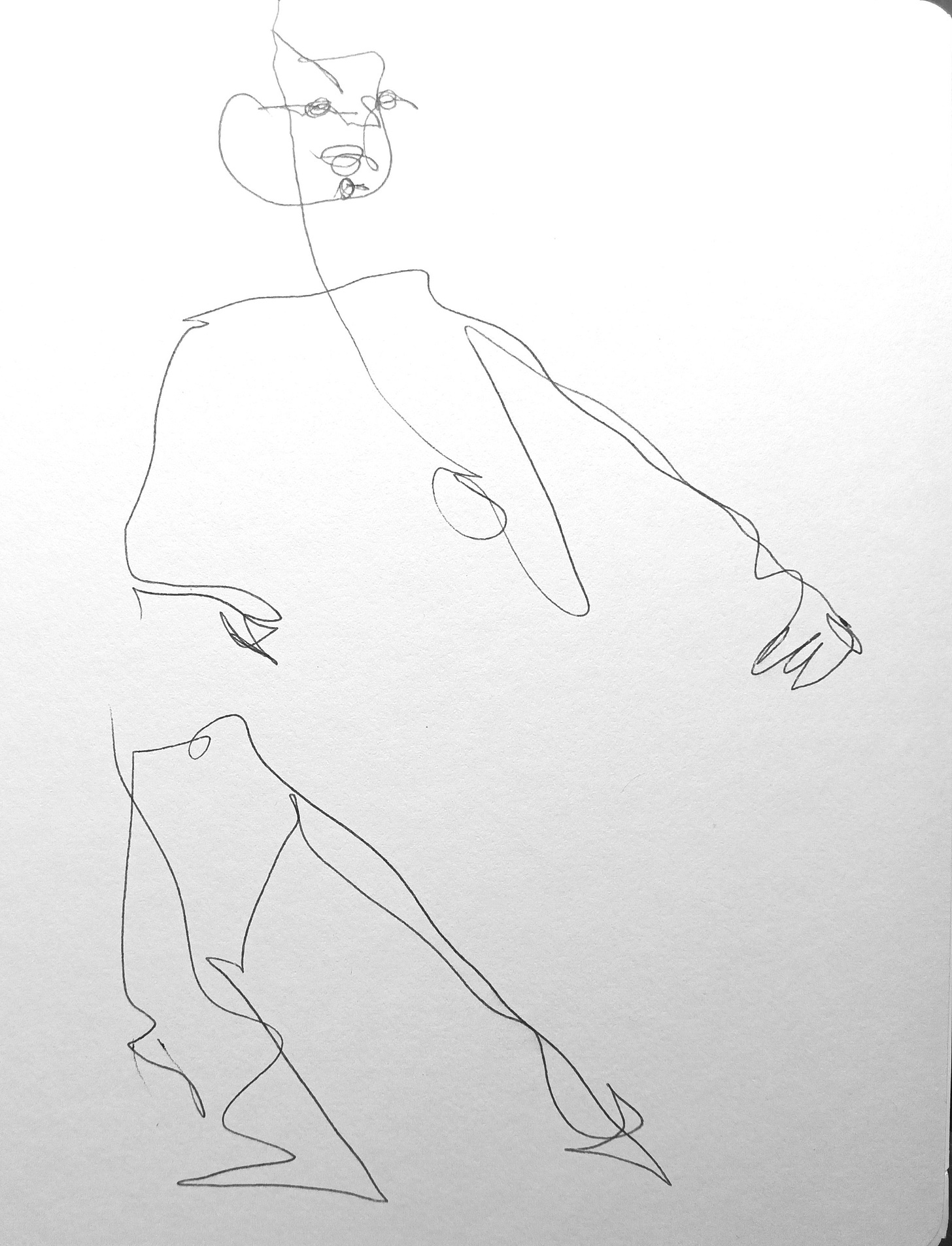Blind Drawing during Turandot - by the author
I had the chance to watch and listen to the opera “Turandot”, by Puccini last night. If you don’t know it, you surely know it’s most beloved aria, “Nessun Dorma” – the uplifting, collective release of sound – associated in my mind with the World Cup – where football fans everywhere roared out in unison – “Vincero” – I will win.
In the opera, this means, I will win in love. Calaf, the hero of the piece, is determined to win the love of Turandot – the Ice Princess. He has correctly answered the three riddles needed to claim her hand – and still, she rejects him – so he gives her a task - she must discover his name by dawn. If she succeeds, she wins, and he will die. If not – she must concede.
Either way, he explains, he might as well die. To take someone because you want them, means nothing because a true relationship must be reciprocal.
Let’s be clear – Turandot is a real bitch. She has already had countless suitors executed – their severed heads line the stage – warning other hopefuls. We learn that she has hardened herself against men in general after witnessing something that happened to her mother – and her mother’s mother. She talks of the horrific rape and murder of a female ancestor, and we can surmise that she has PTSD, probably from such an early childhood experience, that has caused her to close in – to protect herself. In any case, mothers are conspicuous by their absence in this opera…
Pure, simple, virginal womanhood is represented by Liu – the faithful carer of Calaf’s father – the deposed ruler – now old and blind. Liu loves Calef – and in the most shocking part of the opera, she is tortured to reveal his name. This she does not do – instead, snatching a knife and cutting her own throat to protect the man that she worships.
(The character, Liu, is probably based on Puccini’s maid who, after being sacked by his wife – jealous and convinced that the two are having an affair – killed herself. Puccini took this very hard – blaming himself. He died whilst writing “Turandot” but thanks to copious notes and instructions left, it was finished by Franco Alfano and premiered in 1926.)
The ending is a happy one for Calaf and Turandot. Inspired by Liu’s sacrifice, she finds love and he doesn’t die! It is a wonderful opera – the music lifts and pulls the spectator along the road of life in a universal story of love and death.
Blind Drawing during Turandot - by the author
I watched it live-streamed from the Royal Opera House in London to our Cinema in Antibes. Our wide seats reclined, and we sank down into soft leather, with a glass of wine and canapes offered with our tickets. Comfort and sound enveloped us in our blackout, cocoon room where the actors’ every expression was discernible even as the camera zoomed out to take in the panorama of the opulent set. As storytelling goes, this was complete immersion and when I staggered back into reality four hours later, it was with every sinew vibrating with Nessun Dorma and the pitch perfect sound of unbelievably rich vocal passion.
Blind Drawing during Turandot - by the author
Today sees me waking up with a thought:
“What if Turandot had remained intransigent – proud, haughty – refusing to surrender to emotional weakness? What if, as she very nearly did, she cut the head from Calaf’s shoulders, like all the others – without remorse?
The fact that she softened, we understand, is because of her suitor’s obstinate belief in himself. His, “vincero”, is that love conquers all – and it’s worth dying for.
I think:
If Turandot stands for Oligarch (fill in your own favourite here), Calaf and Liu could be all of us!
We, like them, could stand up and be counted. We could demand more from our leaders: - empathy, wisdom, self-awareness and understanding. We, the people, need to make it clear to our Contemporary Universal Narcissist Tyrant (again…), that metaphorically removing the heads of anyone that opposes their world view, is no solution to anything in the long term – or even the short one. These people obviously have fraught family histories – like Turandot. They have axes to grind, scores to be settled – needs to be satisfied, and, like many of us, they simply need to feel that they matter in the grand scheme of things…
Meanwhile, many die needlessly whilst we sit in our comfortable realities and watch them – glued to the ever-unfolding horror on the screen. We are complicit, like the chorus in this opera – (we got the people we voted for after all.) Now, with not much to lose, we need to be the hero and stand up for our values and beliefs. Imagine if we all stood up and sang “Vincero” at the same time?
Imagine what a noise that would generate – imagine how many roofs would be raised…
Imagine…






